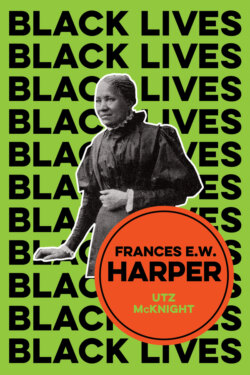Frances E. W. Harper

Реклама. ООО «ЛитРес», ИНН: 7719571260.
Оглавление
Utz McKnight. Frances E. W. Harper
CONTENTS
Guide
Pages
Black Lives series
Frances E. W. Harper. A Call to Conscience
Preface
1 Frances Harper’s Poetic Journey. A life of consciences
Frances Harper in the 1820s and 1830s
Frances Harper in the 1840 and 1850s
African American print culture
Always free
A private life
Frances Harper in the 1860s and 1870s
Frances Harper in the 1880s, 1890s, and 1900s
2Iola Leroy: Social Equality
The plot
Racial healing
Intimacy
Ways of being
The call to action
White equality
Conclusion
3Trial and Triumph: The Public Demand for Equality. Responsibility and judgment
The plot
Race and public opinion
After slavery
Turning race inside out
Christianity
Conclusion
4Sowing and Reaping: Personal Solutions and Conviction. Complicity
The plot
The vote
The personal is political
Women in private and in the public
The plot
Gender and race at home
Of money and fame
Conclusion. Moral choices
Of the women
5Minnie’s Sacrifice and the Poetic License. Politics
Minnie’s Sacrifice
The plot
The poetry of a people
Nation building
A Black faith
The power of prayer
The common struggle
6 Conclusion: Of Poems and Politics
Mourning
The reader: the call to conscience
Bibliography
Index. A
B
C
D
E
F
G
H
I
J
K
L
M
N
O
P
R
S
T
U
V
W
Y
POLITY END USER LICENSE AGREEMENT
Отрывок из книги
Elvira Basevich, W. E. B. Du Bois
Utz McKnight, Frances E. W. Harper
.....
The space of the public in which lectures and political speeches occurred was deemed the province of men, and women were to be granted access only exceptionally. Frances Harper was determined to become a regular public speaker, and she succeeded, but not through the direct intervention of her cousin William Watkins Jr., who was involved in the Abolitionist Movement in the New York area (Washington, 2015, p. 71). She participated in the Movement through the organizational efforts of women. She negotiated her moral stance with her audience as she lectured – as a single woman, later when married, and then as a widow after 1864 – and constantly answered for her erudition, as some accused her of not being Black simply because they lacked experience of Black people with an education (Still, 1872, p. 772; Yee, 1992, pp. 112–14).
Andreá Williams argues that Frances Harper, in her capacity as a single woman for much of her public speaking career, modeled the idea of “single blessedness” (Williams, 2014). Alongside the traditional characterization of single women in public as pernicious and immoral was a social capacity to define the single woman as contributing to the sanctity of marriage, through the single woman’s labor in support of this ideal. As Williams points out, the single woman could also be thought of along a continuum from the “kind Aunt who assists her overwhelmed married sister to the unwed churchgoer who masters fundraising” (Williams, 2014, p. 101). The single woman could in this conceptual frame justify in public their assistance of an anti-slavery cause and organization, in support of the moral probity that this political activism represented; they had found a community that, from this perspective, could make positive use of their single status (Williams, 2014, p. 113). As Williams points out, the support that Frances Harper provided for the widow of John Brown after Harpers Ferry falls within this category of the single woman providing assistance to support marriage, where her status as single allows her to aid the widow unconditionally (Still, 1872, p. 763; Williams, 2014, p. 111).
.....